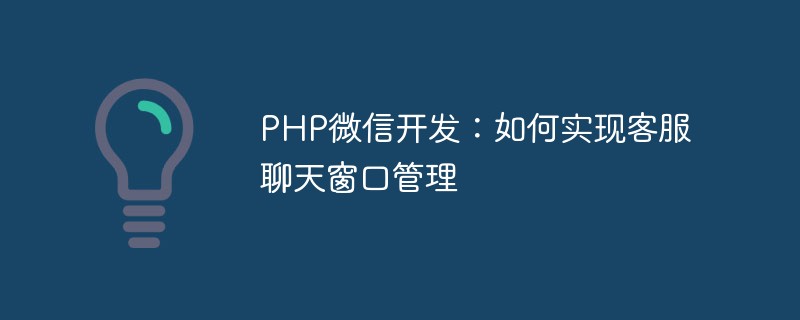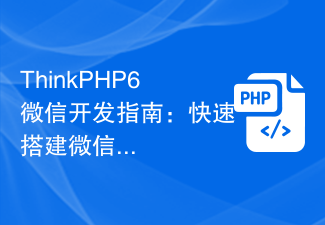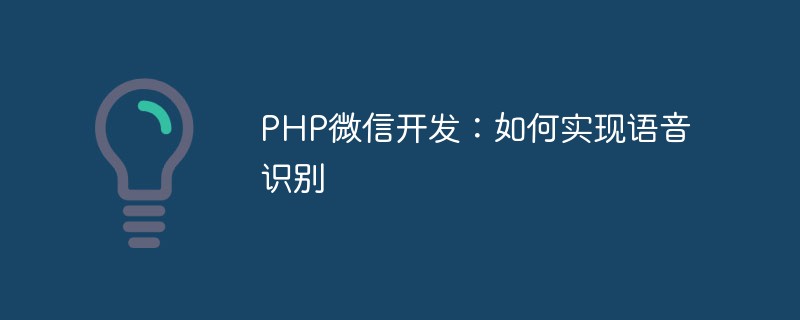 WeChat Applet
WeChat Applet WeChat Development
WeChat Development How to use web api to develop WeChat public account to call Turing robot interface
How to use web api to develop WeChat public account to call Turing robot interfacePassive response message (returning XML)
WeChat requires us to return XML data, and the format is specified. For details, please see
WeChat public platform developer documentation.
We have already written the response entity class before, because the requirement is in XML format.
We use the System.Xml.Serialization.XmlSerializer provided by Microsoft here to serialize our data into XML.
So we marked the XmlRoot attribute on the class, the XmlEnum attribute on the enumerated field, and the XmlArray and XmlArrayItem attributes on the article list in NewsMsg. What is then deserialized is the format required by WeChat.
The serialization method is as follows:
public string ResponseXML(object value, Type type){
StringWriter sw = new StringWriter();
XmlSerializerNamespaces ns = new XmlSerializerNamespaces();
ns.Add("", ""); //去除命名空间
XmlSerializer serializer = new XmlSerializer(type);
serializer.Serialize(sw, value, ns); return sw.ToString();
}Note: The XML namespace must be removed here, otherwise WeChat will not recognize it.
The complete method is provided:
public HttpResponseMessage Post(){ var requestContent = Request.Content.ReadAsStreamAsync().Result; //从正文参数中加载微信的请求参数
XmlDocument xmlDoc = new XmlDocument();
xmlDoc.Load(requestContent);
logger.DebugFormat("WX请求XML内容:{0}", xmlDoc.InnerText); string msgTypeStr = xmlDoc.SelectSingleNode("xml/MsgType").InnerText; string userName = xmlDoc.SelectSingleNode("xml/FromUserName").InnerText; string efhName = xmlDoc.SelectSingleNode("xml/ToUserName").InnerText; string responseContent;
MsgType msgType;
//获取消息类型,若未定义,则返回。
if (!Enum.TryParse(msgTypeStr, true, out msgType))
{
responseContent = MsgService.Instance.ResponseXML(new TextMsg
{
FromUserName = efhName,
MsgType = MsgType.Text,
Content = "俺还小,不知道你在说啥子(⊙_⊙)?",
CreateTime = UnixTimestamp.Now.ToNumeric(),
ToUserName = userName
}, typeof(TextMsg)); return new HttpResponseMessage(HttpStatusCode.OK)
{
Content = new StringContent(responseContent, Encoding.UTF8, "application/xml"),
};
} if (msgType == MsgType.Event)
{ return ProcessEvent(xmlDoc, userName, efhName);
}
//图灵消息转换为微信响应消息,下一节奉上
string content = xmlDoc.SelectSingleNode("xml/Content").InnerText; var requestResult = TuLingService.Instance.GetMsgFromResponse(content, userName, efhName);
responseContent = MsgService.Instance.ResponseXML(requestResult.Data, requestResult.DataType); return new HttpResponseMessage(HttpStatusCode.OK)
{
Content = new StringContent(responseContent, Encoding.UTF8, "application/xml"),
};
}private HttpResponseMessage ProcessEvent(XmlDocument xmlDoc, string userName, string efhName){ string eventValue = xmlDoc.SelectSingleNode("xml/Event").InnerText; var responseContent = MsgService.Instance.ResponseXML(new TextMsg
{
FromUserName = efhName,
MsgType = MsgType.Text,
Content = eventValue.ToLower().Equals("subscribe") ? "lei好哇~" : "大爷,奴家会想你的",//其实取消订阅是不会发送消息的
CreateTime = UnixTimestamp.Now.ToNumeric(),
ToUserName = userName
}, typeof(TextMsg)); return new HttpResponseMessage(HttpStatusCode.OK)
{
Content = new StringContent(responseContent, Encoding.UTF8, "application/xml"),
};
}So far, we have completed the response to WeChat passive reply messages.
Mapping Turing messages and WeChat messages
We have already implemented the function of passively replying to messages. Next, we need to associate the Turing robot interface with our public platform.
Analyzing the parameters returned by the Turing robot, we found that all types of content have code and text parameters. And because we need to directly correspond Turing's message to WeChat's response message, we define an interface and provide a conversion method
public class TuLingResult{ //消息类型(我们在序列化为XML的时候需要提供类型)
public Type DataType { get; set; } public object Data { get; set; }
}public interface IResponse{ TuLingResult ToTuLingResult(string fromUserName, string toUserName);
}Create an entity of text data as the base class of Turing message (corresponding to WeChat's Text message)
public class TextResult : IResponse{ public int Code { get; set; } public string Text { get; set; } public virtual TuLingResult ToTuLingResult(string fromUserName, string toUserName) { return new TuLingResult
{
DataType = typeof(TextMsg),
Data = new TextMsg
{
FromUserName = fromUserName,
ToUserName = toUserName,
Content = Text,
CreateTime = UnixTimestamp.Now.ToNumeric(),
MsgType = MsgType.Text
}
};
}
}Then create entity classes for various data in sequence.
For example: News (corresponding to WeChat graphic messages)
public class NewsResult : TextResult{ public List<NewsInfo> List { get; set; } public override TuLingResult ToTuLingResult(string fromUserName, string toUserName) { if (List.Count > 10)
{
List = List.Take(10).ToList();
} return new TuLingResult
{
DataType = typeof(NewsMsg),
Data = new NewsMsg
{
FromUserName = fromUserName,
ToUserName = toUserName,
ArticleCount = List.Count,
Articles = List.Select(m => new MsgNewsInfo
{
Title = m.Article,
Description = m.Source,
Url = m.DetailUrl,
PicUrl = m.Icon
}).ToList(),
CreateTime = UnixTimestamp.Now.ToNumeric(),
MsgType=MsgType.News
}
};
}
}public class NewsInfo{ /// <summary>
/// 标题
/// </summary>
public string Article { get; set; } /// <summary>
/// 来源
/// </summary>
public string Source { get; set; } /// <summary>
/// 详情地址
/// </summary>
public string DetailUrl { get; set; } /// <summary>
/// 图标地址
/// </summary>
public string Icon { get; set; }
}Similarly create various data entity classes provided by Turing robot
The data entities we want to support have been defined After that, we can start to request the Turing interface and obtain the real message. Here we use HttpClient to implement it.
private const string TULING_API_URL = "http://www.tuling123.com/openapi/api";private const string TULING_API_KEY = "XXXXX";//图灵的APIKEYpublic TuLingResult GetMsgFromResponse(string keyword, string userFlag, string efhName){ string linkString = string.Format("{0}?key={1}&info={2}&userid={3}"
, TULING_API_URL, TULING_API_KEY, keyword, userFlag); string content = string.Empty; using (HttpClient client = new HttpClient())
{
HttpResponseMessage response = client.GetAsync(linkString).Result;
content = response.Content.ReadAsStringAsync().Result;
logger.DebugFormat("图灵机器人响应:{0}", content);
} return ConvertToMsg(content, userFlag, efhName);
}Turing returns the code identification message type and error information, so we first parse the response message into TextResult and get the Turing type.
First define the Turing type enumeration
public enum ResultType
{
TL_FORMAT_DATA = 50000,
TL_TEXT_DATA = 100000,
TL_LINK_DATA = 200000,
TL_NOVEL_DATA = 301000,
TL_NEWS_DATA = 302000,
TL_APP_DATA = 304000,
TL_TRAIN_DATA = 305000,
TL_AIRPORT_DATA = 306000,
TL_TUAN_DATA = 307000,
TL_TUWEN_DATA = 308000,
TL_HOTEL_DATA = 309000,
TL_LOTTERY_DATA = 310000,
TL_PRICE_DATA = 311000,
TL_RESTAURANT_DATA = 312000,
TL_ERROR_LENGTH = 40001,
TL_ERROR_EMPTY = 40002,
TL_ERROR_INVALID = 40003,
TL_ERROR_OUTLIMIT = 40004,
TL_ERROR_NOTSUPPORT = 40005,
TL_ERROR_SERVERUPDATE = 40006,
TL_ERROR_SERVERERROR = 40007
}The return code corresponding to Turing
100000 文本类数据 200000 网址类数据 301000 小说 302000 新闻 304000 应用、软件、下载 305000 列车 306000 航班 307000 团购 308000 优惠 309000 酒店 310000 彩票 311000 价格 312000 餐厅 40001 key的长度错误(32位) 40002 请求内容为空 40003 key错误或帐号未激活 40004 当天请求次数已用完 40005 暂不支持该功能 40006 服务器升级中 40007 服务器数据格式异常 50000 机器人设定的“学用户说话”或者“默认回答”
And then get the message type
private ResultType GetResultType(string response)
{
var result = JsonConvert.DeserializeObject<TextResult>(response);
return (ResultType)result.Code;
}, we will Corresponding TuLingResult can be returned according to different types.
public TuLingResult ConvertToMsg(string response, string userFlag, string efhName)
{
IResponse result = null;
var resultType = GetResultType(response); switch (resultType)
{ case ResultType.TL_TEXT_DATA:
result = JsonConvert.DeserializeObject<TextResult>(response); break; case ResultType.TL_LINK_DATA:
result = JsonConvert.DeserializeObject<LinkResult>(response); break; case ResultType.TL_NEWS_DATA:
result = JsonConvert.DeserializeObject<NewsResult>(response); break; case ResultType.TL_TUWEN_DATA:
result = JsonConvert.DeserializeObject<TuWenResult>(response); break; case ResultType.TL_TRAIN_DATA:
result = JsonConvert.DeserializeObject<TrainResult>(response); break; case ResultType.TL_AIRPORT_DATA:
result = JsonConvert.DeserializeObject<AirportResult>(response); break; case ResultType.TL_APP_DATA:
result = JsonConvert.DeserializeObject<AppResult>(response); break; case ResultType.TL_HOTEL_DATA:
result = JsonConvert.DeserializeObject<HotelResult>(response); break; case ResultType.TL_PRICE_DATA:
result = JsonConvert.DeserializeObject<PriceResult>(response); break; case ResultType.TL_ERROR_LENGTH:
case ResultType.TL_ERROR_INVALID:
case ResultType.TL_ERROR_EMPTY:
case ResultType.TL_ERROR_OUTLIMIT:
result = new TextResult { Text = "您的输入有误" }; break; case ResultType.TL_ERROR_SERVERERROR:
case ResultType.TL_ERROR_SERVERUPDATE:
result = new TextResult { Text = "服务器忙,暂时无法为您提供服务" }; break; case ResultType.TL_ERROR_NOTSUPPORT:
result = new TextResult { Text = "俺还小,您说的这个还得慢慢学习,以后再来试吧" }; break;
default:
result = new TextResult { Text = "俺还小,不知道你在说啥子(⊙_⊙)?" }; break;
} return result.ToTuLingResult(efhName, userFlag);
}Then, we can serialize the Data in the TuLingResult we got into the XML required by WeChat
var requestResult = TuLingService.Instance.GetMsgFromResponse(content, userName, efhName);
responseContent = MsgService.Instance.ResponseXML(requestResult.Data, requestResult.DataType);return new HttpResponseMessage(HttpStatusCode.OK)
{
Content = new StringContent(responseContent, Encoding.UTF8, "application/xml"),
};The above is the detailed content of How to use web api to develop WeChat public account to call Turing robot interface. For more information, please follow other related articles on the PHP Chinese website!
 PHP微信开发:如何实现消息加密解密May 13, 2023 am 11:40 AM
PHP微信开发:如何实现消息加密解密May 13, 2023 am 11:40 AMPHP是一种开源的脚本语言,广泛应用于Web开发和服务器端编程,尤其在微信开发中得到了广泛的应用。如今,越来越多的企业和开发者开始使用PHP进行微信开发,因为它成为了一款真正的易学易用的开发语言。在微信开发中,消息的加密和解密是一个非常重要的问题,因为它们涉及到数据的安全性。对于没有加密和解密方式的消息,黑客可以轻松获取到其中的数据,对用户造成威胁
 PHP微信开发:如何实现客服聊天窗口管理May 13, 2023 pm 05:51 PM
PHP微信开发:如何实现客服聊天窗口管理May 13, 2023 pm 05:51 PM微信是目前全球用户规模最大的社交平台之一,随着移动互联网的普及,越来越多的企业开始意识到微信营销的重要性。在进行微信营销时,客服服务是至关重要的一环。为了更好地管理客服聊天窗口,我们可以借助PHP语言进行微信开发。一、PHP微信开发简介PHP是一种开源的服务器端脚本语言,广泛运用于Web开发领域。结合微信公众平台提供的开发接口,我们可以使用PHP语言进行微信
 PHP微信开发:如何实现用户标签管理May 13, 2023 pm 04:31 PM
PHP微信开发:如何实现用户标签管理May 13, 2023 pm 04:31 PM在微信公众号开发中,用户标签管理是一个非常重要的功能,可以让开发者更好地了解和管理自己的用户。本篇文章将介绍如何使用PHP实现微信用户标签管理功能。一、获取微信用户openid在使用微信用户标签管理功能之前,我们首先需要获取用户的openid。在微信公众号开发中,通过用户授权的方式获取openid是比较常见的做法。在用户授权完成后,我们可以通过以下代码获取用
 用PHP开发微信群发工具May 13, 2023 pm 05:00 PM
用PHP开发微信群发工具May 13, 2023 pm 05:00 PM随着微信的普及,越来越多的企业开始将其作为营销工具。而微信群发功能,则是企业进行微信营销的重要手段之一。但是,如果只依靠手动发送,对于营销人员来说是一件极为费时费力的工作。所以,开发一款微信群发工具就显得尤为重要。本文将介绍如何使用PHP开发微信群发工具。一、准备工作开发微信群发工具,我们需要掌握以下几个技术点:PHP基础知识微信公众平台开发开发工具:Sub
 如何使用PHP进行微信开发?May 21, 2023 am 08:37 AM
如何使用PHP进行微信开发?May 21, 2023 am 08:37 AM随着互联网和移动智能设备的发展,微信成为了社交和营销领域不可或缺的一部分。在这个越来越数字化的时代,如何使用PHP进行微信开发已经成为了很多开发者的关注点。本文主要介绍如何使用PHP进行微信开发的相关知识点,以及其中的一些技巧和注意事项。一、开发环境准备在进行微信开发之前,首先需要准备好相应的开发环境。具体来说,需要安装PHP的运行环境,以及微信公众平台提
 ThinkPHP6微信开发指南:快速搭建微信公众号应用Aug 26, 2023 pm 11:55 PM
ThinkPHP6微信开发指南:快速搭建微信公众号应用Aug 26, 2023 pm 11:55 PMThinkPHP6微信开发指南:快速搭建微信公众号应用引言:微信公众号作为一种重要的社交媒体平台,为个人和企业在市场推广、信息传播等方面提供了很大的机会。在这篇文章中,我们将介绍如何使用ThinkPHP6快速搭建一个微信公众号应用,并且提供一些常用的代码示例。环境准备在开始开发之前,我们首先需要准备好以下环境:PHP7以上版本ThinkPHP6框架微信公众号
 PHP微信开发:如何实现群发消息发送记录May 13, 2023 pm 04:31 PM
PHP微信开发:如何实现群发消息发送记录May 13, 2023 pm 04:31 PM随着微信成为了人们生活中越来越重要的一个通讯工具,其敏捷的消息传递功能迅速受到广大企业和个人的青睐。对于企业而言,将微信发展为一个营销平台已经成为趋势,而微信开发的重要性也逐渐凸显。在其中,群发功能更是被广泛使用,那么,作为PHP程序员,如何实现群发消息发送记录呢?下面将为大家简单介绍一下。1.了解微信公众号相关开发知识在了解如何实现群发消息发送记录之前,我
 PHP微信开发:如何实现语音识别May 13, 2023 pm 09:31 PM
PHP微信开发:如何实现语音识别May 13, 2023 pm 09:31 PM随着移动互联网的普及,微信作为一款社交软件,越来越多的人开始使用,并且微信开放平台也给开发者带来了众多的机会。近年来,随着人工智能技术的发展,语音识别技术逐渐成为了移动端开发的热门技术之一。在微信开发中,如何实现语音识别成为很多开发者关注的问题。本文将介绍如何利用PHP开发微信应用实现语音识别功能。一、语音识别原理在介绍如何实现语音识别之前,我们先了解一下语


Hot AI Tools

Undresser.AI Undress
AI-powered app for creating realistic nude photos

AI Clothes Remover
Online AI tool for removing clothes from photos.

Undress AI Tool
Undress images for free

Clothoff.io
AI clothes remover

AI Hentai Generator
Generate AI Hentai for free.

Hot Article

Hot Tools

SublimeText3 Chinese version
Chinese version, very easy to use

SublimeText3 Mac version
God-level code editing software (SublimeText3)

MantisBT
Mantis is an easy-to-deploy web-based defect tracking tool designed to aid in product defect tracking. It requires PHP, MySQL and a web server. Check out our demo and hosting services.

Dreamweaver CS6
Visual web development tools

DVWA
Damn Vulnerable Web App (DVWA) is a PHP/MySQL web application that is very vulnerable. Its main goals are to be an aid for security professionals to test their skills and tools in a legal environment, to help web developers better understand the process of securing web applications, and to help teachers/students teach/learn in a classroom environment Web application security. The goal of DVWA is to practice some of the most common web vulnerabilities through a simple and straightforward interface, with varying degrees of difficulty. Please note that this software





